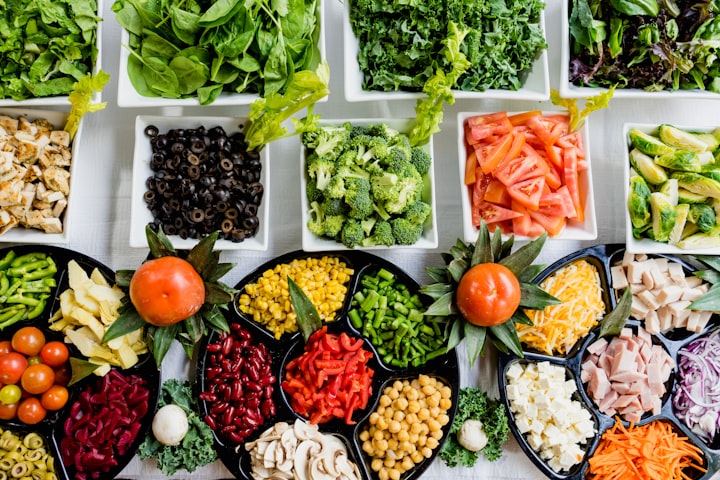Nourishing Our Bodies: Exploring the World of Human Foods
Fueling Your Body: Embracing the Nutritional Power of Human Foods
Food is not only a source of sustenance but also a reflection of our culture, traditions, and personal preferences. As human beings, our dietary choices play a significant role in our overall health and well-being. This article delves into the diverse realm of human foods, exploring their nutritional value, the impact of food choices on our bodies, and providing insights into creating a balanced and nourishing diet.
1. The Power of Nutrient-Rich Foods: Fueling Our Bodies
Nutrient-rich foods form the foundation of a healthy and balanced diet. Consider the following key nutrients and their benefits:
a) Macronutrients: Carbohydrates, proteins, and fats provide energy and support vital bodily functions. Opt for whole grains, lean proteins, and healthy fats for sustained energy and optimal nutrition.
b) Vitamins and Minerals: Essential vitamins and minerals support various bodily functions, such as immune function, bone health, and energy metabolism. Include a variety of fruits, vegetables, nuts, and seeds in your diet to ensure an adequate intake of these micronutrients.
c) Fiber: Dietary fiber aids digestion, promotes bowel regularity, and helps maintain healthy blood sugar and cholesterol levels. Whole grains, legumes, fruits, and vegetables are excellent sources of fiber.
2. The Beauty of Plant-Based Foods: Embracing a Plant-Powered Lifestyle
Plant-based diets have gained popularity for their health benefits, environmental sustainability, and ethical considerations. Consider the following aspects:
a) Fruits and Vegetables: Colorful fruits and vegetables are rich in vitamins, minerals, antioxidants, and fiber. Aim to include a variety of these in your meals to maximize nutritional intake.
b) Whole Grains: Whole grains, such as quinoa, brown rice, and oats, provide complex carbohydrates, fiber, and essential nutrients. Replace refined grains with whole grains for sustained energy and improved overall health.
c) Legumes and Pulses: Legumes, including beans, lentils, and chickpeas, are excellent sources of plant-based protein, fiber, vitamins, and minerals. Incorporate them into soups, stews, salads, or as meat substitutes in various dishes.
d) Nuts and Seeds: Nuts and seeds offer healthy fats, protein, fiber, and a range of vitamins and minerals. Snack on almonds, walnuts, chia seeds, or flaxseeds for added nutritional benefits.
3. Animal-Based Foods: Balancing Nutritional Needs
Animal-based foods can provide essential nutrients, including high-quality proteins, vitamins, and minerals. Consider the following aspects:
a) Lean Proteins: Incorporate lean sources of protein, such as poultry, fish, eggs, and low-fat dairy products, into your diet. These provide essential amino acids for tissue repair and growth.
b) Fish and Seafood: Fatty fish, like salmon, sardines, and mackerel, are rich in omega-3 fatty acids, which support brain health and cardiovascular function. Aim to include fish in your diet regularly.
c) Dairy Products: Dairy products like milk, yogurt, and cheese are sources of calcium, protein, and other essential nutrients. Opt for low-fat or reduced-fat options to minimize saturated fat intake.
4. Mindful Eating: Cultivating a Healthy Relationship with Food
Mindful eating emphasizes the connection between the body and mind, allowing for a more conscious and positive eating experience. Consider the following principles:
a) Listen to Your Body: Pay attention to hunger and fullness cues, eat when you're hungry, and stop when you're satisfied. Avoid distractions while eating to fully savor and appreciate your meals.
b) Enjoy a Variety of Flavors: Experiment with diverse flavors, herbs,
and spices to make your meals enjoyable and satisfying. This can reduce the tendency to rely on unhealthy additives like excess salt or sugar.
c) Practice Portion Control: Be mindful of portion sizes to avoid overeating. Use smaller plates and bowls, and take time to savor each bite.
5. Customizing Your Diet: Personalization for Optimal Health
Everyone's nutritional needs and preferences are unique. Customizing your diet can help you achieve optimal health and well-being. Consider the following:
a) Dietary Restrictions and Allergies: Adapt your diet to accommodate any food allergies or intolerances. Consult with a healthcare professional or registered dietitian for guidance.
b) Cultural and Ethical Considerations: Honor your cultural background and personal beliefs while making informed choices about your food sources. Seek locally sourced, sustainable, and ethically produced ingredients whenever possible.
c) Health Conditions and Goals: If you have specific health conditions or goals, such as weight management or managing chronic diseases, consult with a healthcare professional or registered dietitian to develop a personalized plan.
Conclusion:
Human foods encompass a vast and diverse array of options, each offering unique nutritional benefits and flavors. By embracing a diet rich in nutrient-dense foods, including a variety of fruits, vegetables, whole grains, lean proteins, and healthy fats, we can nourish our bodies and promote overall health. Remember to listen to your body, practice mindful eating, and customize your diet based on your unique needs and preferences. With conscious choices and a balanced approach, we can embark on a lifelong journey of nourishment and well-being.







Comments
There are no comments for this story
Be the first to respond and start the conversation.